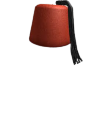I caught some bad vibes from the chuds on the last one. Some of you don't understand the concept that the bad guy has his own perspective which is worth knowing even if we don't agree with it. Here's Israel's turn. I can't promise a happy ending because there wasn't one, but these are the events that mattered to them.
Part of a series:
Israel, like Syria, does not have the luxury of simply ignoring Lebanon. For most of its history somebody has been there shooting at them or trying to
shoot at them. Egypt and Jordan had learned Israel's enormous superiority in high-intensity mobile warfare and made peace. Israelis hoped to one day do the same with Lebanon. Once all the neighboring Arab were persuaded to give up, the wars would finally be over.
1975
Hollywood was in the middle of its disaster movie craze just as the Middle East was in the middle of its hijacking craze. (Don't watch these movies. They're dumber than Transformers.)
Israel never had good relations with Lebanon, but at least it wasn't a base for constant raids like Syria, Jordan, and Egypt. That changed in the late 1960s when Palestinians from the refugee camps began going to the border and attacking Israel. The Lebanese army tried to stop them but were not always successful. The problem grew far worse in 1970 when the Palestinian leaders were driven out of Jordan and made Beirut their headquarters. From there they hijacked airliners, attacked Israelis in Europe, and dramatically increased raiding across the border. They killed civilians on buses, in their homes, or even at school. The Palestinians didn't kill many Israeli soldiers but somehow always managed to kill a lot of children. Most of these attacks were done by fringe far-left groups but Arafat and his "moderate" faction Fatah participated as well.
Terrorists were able to board in Beirut, go anywhere in the world, hijack a plane, and bring it to the Middle East.
Obviously this had to be stopped. The Israelis didn't want a full scale war in Lebanon but they had to do something. As early as 1968 they began carrying out commando raids to pressure the Lebanese into getting the Palestinians under control. But by 1975 it was clear that the Lebanese state couldn't rein them in if it tried. The commando raids now were turned to directly strike the Palestinians themselves. A raid against Fatah in Beirut succeeded in assassinating the targets but ended up being counterproductive. The Palestinians pointed out that the army was unable or unwilling to protect them so they needed they needed arms to protect themselves. Many Lebanese agreed with them. This was one of the major triggers leading up to the outbreak of the civil war.
At this point it wasn't enough just to stop terrorism. As civil war loomed, there was a real danger that the Palestinians would win and take over the whole country. With their own international airport, seaport, and complete access to the border they could dramatically increase their terrorist activities. Beyond their own strategic interests, many Israelis saw the similarity of the Lebanese Christians' plight to their own. They were an island in a sea of hostile Muslim powers that would love to drive them into the sea. During a previous crisis in 1958 Israel had provided weapons to then President Chamoun to stop the Syrians from taking over. Now they were in contact with his son Dany Chamoun about possibly doing the same again.
1980
Blondie's "Call Me". Hafez el-Assad probably hummed this to himself when he was putting military pressure on one of the Lebanese factions and waiting for them to call and ask for a truce.
The Christian militias didn't take up the Israeli offer as their situation was so desperate that they called for a Syrian invasion instead. But they had quickly tired of the Syrian occupation and went back to the Israelis for support. The Israelis provided guns, tanks, ammunition, and even uniforms. The year 1980 was relatively quiet in most of the country but there was a tense standoff between the Lebanese Forces, Palestinians, and Syrians.
The SA-6 SAM system. It was deadly to Israeli planes in the 1973 war and and they did not want to repeat that experience. Through the Americans a convoluted set of rules were agreed to. The Syrians could move their SAMs into certain places in the Bekaa Valley, but only if they didn't camoflauge them, and so on. Of course both sides ended up breaking these rules as soon as tensions rose.
At the border it was anything but quiet. The Palestinians were shelling Israeli towns with heavy artillery and rockets. Eventually they were able to negotiate a cease-fire through the Americans, the first time that Israel had made any kind of deal with the Palestinians. But it was only a matter of time before they would start shooting again and send more terrorists by boat to hijack more school buses. No matter how many bombs they dropped or houses they destroyed, the enemy would not stop. Something had to be done to push them back away from the border. In 1978 they had sent in a large force to sweep across the border all the way up to the Litani River but it failed to catch many Palestinians, who retreated before the overwhelming power of the IDF but moved right back into place as soon as they left.
Remains of the bus hijacked in the Coastal Road massacre, where 38 civilians were killed, including 13 children.
Temporarily supressing the violence was not good enough. A permanent solution was needed, one that would keep enemies away from the border for good. Some Lebanese army units in the south defected and became the nucleus of the South Lebanon Army. This was a force under Israeli control whose mission was to block the Palestinians from getting to the border. But the border was too long for a few thousand men to patrol and few Lebanese wanted to join it. Those who did were often motivated by the $300/month salary and couldn't be relied on. The SLA was a step forward, but the bizarre little ministate of 180,000 people they created in the IDF-occupied "security zone" could never sustain a large fighting force or be recognized as legitimate by the rest of Lebanon.
The extent of the security zone. On the coast you can see Sidon to the North and Tyre to the south.
Some Israelis saw an opportunity to go much further than the SLA. At first they had sent weapons to all the Christian militias through Dany Chamoun and his NLP, but soon they got directly in touch with the Lebanese Forces. Their leader, Bashir Gemayel, was charismatic, ambitious, and Maronite, all qualities that were needed to become President of Lebanon. He had just defeated and absorbed Chamoun's forces leaving no Christian rivals. Maybe he could unite the whole country? Then he could sign a peace treaty with Israel and drive out the Palestinians.
Shermans used by the SLA. With upgrades, the old WW2 tank was still effective against the poorly-equipped troops they usually fought against.
1985
Bashir Gemayel was dead. He had managed to get elected with the help of the Israeli invasion but he refused to sign the peace treaty. It didn't matter. The Syrians had him blown up anyway. He didn't even live long enough to be inaugurated. There was nobody else who could take his place, so there was no purpose to having Israeli troops occupy half the country. Their project to install a friendly government in Beirut had been a complete fiasco. The prime minister resigned and the defense minister Ariel Sharon was fired and disgraced. (There were no consequences for the Lebanese involved. Their leader was made a cabinet minister like nothing had happened.) Now in 1985 the IDF was in the process of pulling their troops back from near Beirut to the security zone.
IDF Headquarters in Tyre after being hit by a suicide car bomb, killing 75 Israelis and several prisoners, 1982. They were dangerously exposed to this kind of attack as long as they occupied such a large and densely populated are.
They could at least be glad that they achieved their first objective, to drive the PLO out of Lebanon. The refugee camps were still there and still full of desperately impoverished Palestinian civilians, but the soldiers and terrorists were gone. Arafat had not just been pushed back from the border. He had been pushed back 2,000km to exile in Tunis. In the process the invaders had devastated half the country and killed tens of thousands. They left behind them new enemies. Amal was now actively fighting against them and Hezbollah came into existence in large part due to the invasion. These forces were not as dangerous as the Palestinians had been, but now it was necessary to keep IDF troops in the security zone permanently to keep them away from the border.
It might be boring out there, but at least you have your walkman.
1990
At the end of the Lebanese Civil War, it was the Syrians who dominated Lebanon. For Israel this was much worse than a friendly Lebanese government but at least it was better than the Palestinians taking over. The security zone would have to stay in place indefinitely until some big change happened in Lebanon to disarm Hezbollah, but the Israelis understood now that that big change wasn't going to be them. For the time being, it wasn't that bad. They had chosen easily defended positions to include in the security zone so it was much better than fighting on their own border. And these Hezbollah guys really didn't know how to fight.
Beaufort Castle. A lot of Israelis guarded this place over the years. Its view was just as important in modern warfare as it was to the Crusaders.
Occupation duty was dull and unpleasant. It cost money and diverted troops away from training and more important fronts like the West Bank and Gaza. As long as it continued no Lebanese would negotiate with them. But it was effective in drastically reducing the shelling hitting villages inside Israel. It seemed like it might go on forever.
The view looking down from Beaufort castle.
Epilogue
The situation quickly changed in the late 1990s. Hezbollah learned over the years, going from a bunch of angry hillbillies yelling "Allahu Akbar!" on top of a hill to a well-organized, trained, and experienced fighting force. They had become better at fighting this kind of low-level war of attrition than the Israelis. In theory Israel could just launch a massive attack and change it back into the kind of high-intensity war they were good at. This was tried in 1993 and 1996, but domestic politics and diplomacy wouldn't let them go far and they accomplished little. Eventually those troops would have to go home someday anyway.
The TOW antitank missile. Iran gave Hezbollah ones that had been first delivered to it through Israel in Iran Contra. Nobody could complain about it without reopening that can of worms.
By the late 1990s the tide was turning fast. Israeli tanks, once so formidable to the guerrilla fighters, became easy targets when they got guided antitank missiles. The SLA and its intelligence network was collapsing. Two incidents in particular made the public wonder if it was all worth it. In 1997 two helicopters collided killing 73 men. Even more disturbing, an elite special operations unit was lured into an ambush and 12 of 16 killed. Clearly Hezbollah had better intelligence and knew how to use it.
Hezbollah intercepted unencrypted transmissions from the drone, allowing them to watch the Israelis in real time through their own camera.
In 2000 the IDF began withdrawing. With the situation crumbling around them, they retreated back into Israel. The SLA disintegrated with troops and their families rushing to the border to for asylum. It wouldn't be the last time there was fighting on this border but at least on this day all of Lebanon was finally at peace for the first time in 25 years.




















Jump in the discussion.
No email address required.
If this was a video doc iwouldwatchit right now
However
Jump in the discussion.
No email address required.
Here you go then. It's 15 hours long but at least you don't have to read too much.
I mean come on, I've met someone who's actually near caught up on Geno Samuel's biography of ChrisChan.
Jump in the discussion.
No email address required.
Bro I appreciate The effort but its 100% subtitled; ergo I STILL HAVE TO READ IT; why the frick would I choose reading for 15 hours l when im tldring the 10 mins it would take to read the massive wall of text OP
Jump in the discussion.
No email address required.
More options
Context
More options
Context
More options
Context